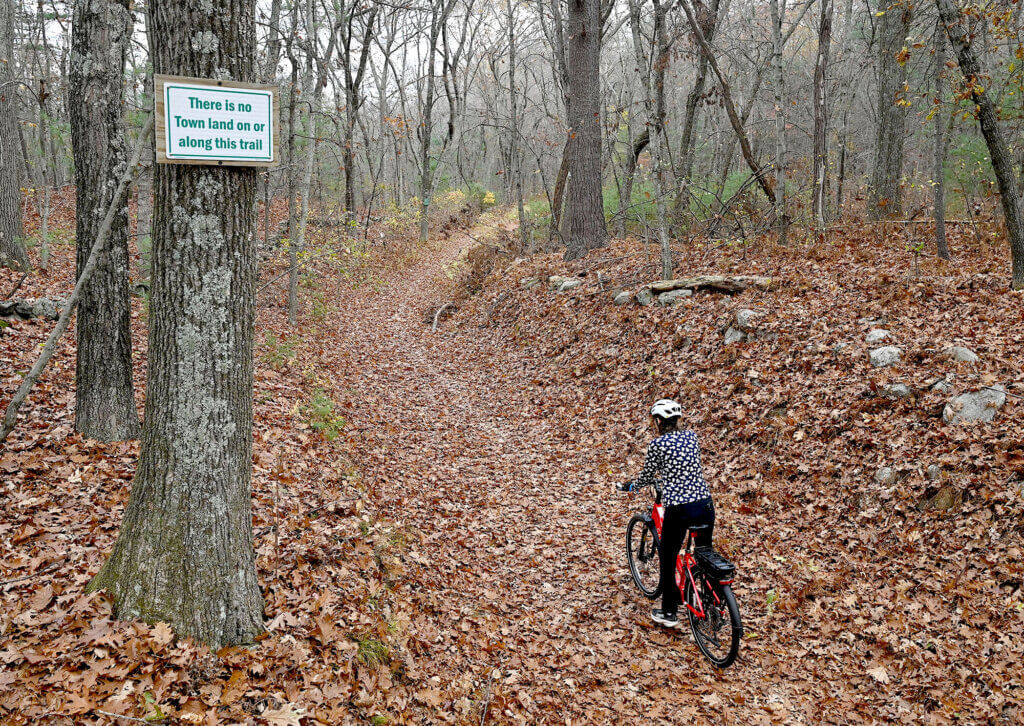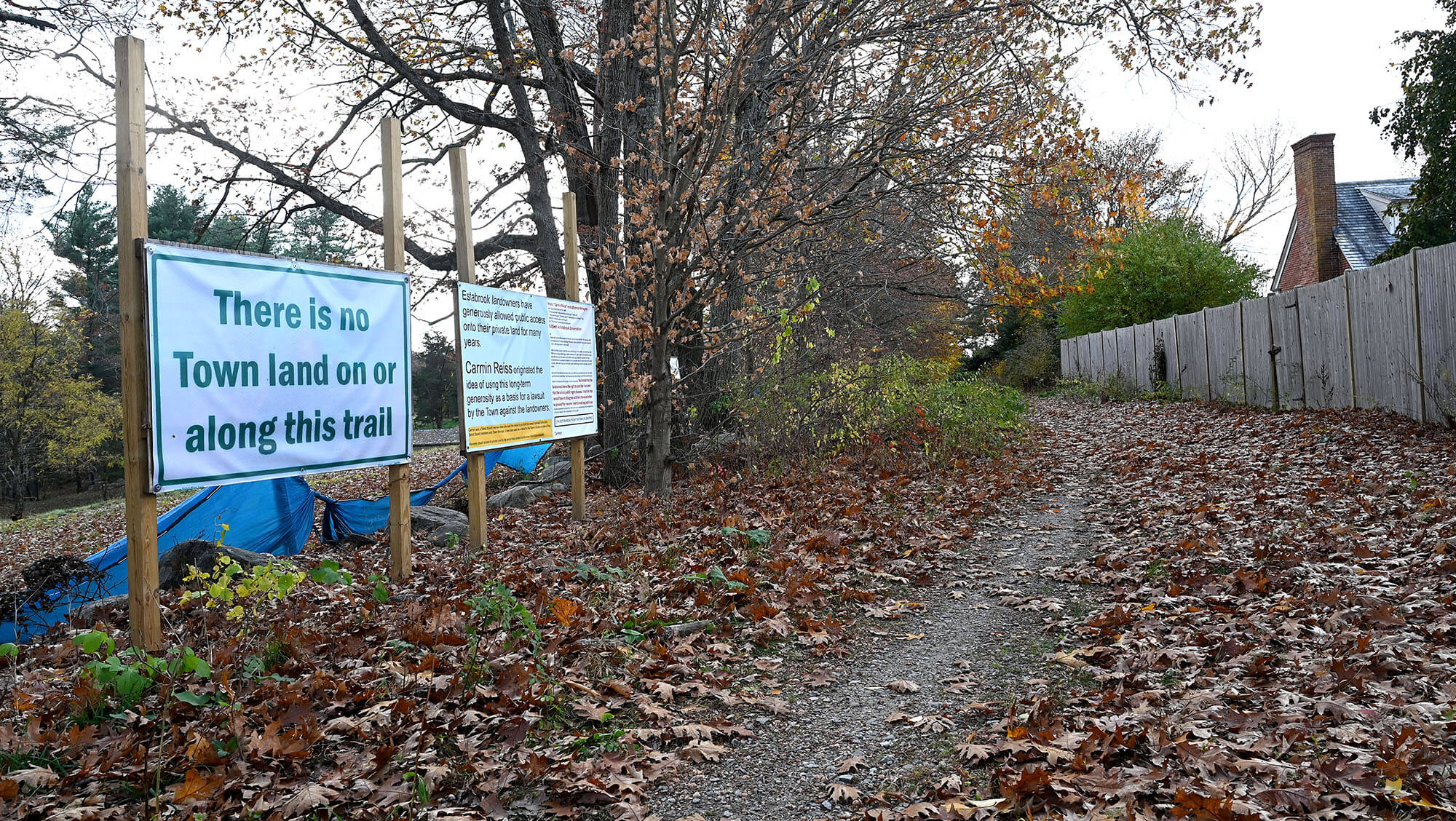By Erin Tiernan — Erin@concordbridge.org
The town’s quest to preserve public access to a tree-lined footpath at the northern end of Estabrook Road has cost taxpayers almost $2 million as the legal tussle enters its eighth year.
The courthouse clash that began in 2016 when Concord sued neighboring property owners who threatened to block access to Estabrook Trail has wound its way from Land Court to the state Appeals Court and now rests with the Supreme Judicial Court.
As the case has dragged on, tempers have flared over the 1.8-mile stretch of trail. Over the years, landowners have erected massive signs, set up surveillance cameras, and draped tarps to ward off members of the public, who feuded with owners over leashing dogs.
All the while, Concord racked up legal bills unprecedented in recent memory.
“I’ve been with the town since September 2016, and this is by far our largest legal expense during my tenure,” Town Manager Kerry Lafleur said.
A Concord Bridge review of invoices related to the Estabrook case revealed that the town has spent approximately $1.97 million on the case so far, with the vast majority spent on outside legal counsel.
- The law firm representing the town, Anderson & Kreiger, charged Concord a total of $1,924,432 from the start of the case in 2016 through October 2024.
- Data storage company IST charged Concord $8,043 in fees for maintaining archives during that period.
- A.R. Vannozzi and Associates, a Maine land surveying firm that assisted attorneys from 2019 to 2021, charged the town $32,628, partially redacted invoices show.
- There’s also a $10,506 charge from The Public Archaeology Laboratory Inc. of Rhode Island for “costs associated with trial preparation and testimony.”
The $1,975,609 spent so far by the town could still increase, officials say, as landowners have filed an application or a second appeal with the Supreme Judicial Court.
Although the Estabrook case is ongoing, Lafleur said she anticipates only “nominal spending from here on out.”
“We are nearing the end of the Estabrook litigation; as the case is now in front of the SJC for consideration, to the best of my understanding, there will be no further avenue of appeal,” she said.
A long history
Estabrook Trail is a 1.8-mile stretch connecting to Carlisle that has been open to Concordians — by buggy, by car, or by foot — for 261 years, town records show. But it has been closed to vehicles for more than 90 years.
The town opted to discontinue the northern section in 1932 as it was rarely used as a means of travel, so it no longer had to be maintained on the taxpayers’ dime. In the decades since, it has become a popular destination for hikers, cyclists, and dog walkers.
Lafleur said she was “not surprised” to see the attorney bills added up due to the “amount of time this matter has taken.”
The cost “is certainly very significant and further exacerbated by the number of appeals of the lower court’s decision in favor of the town,” she said.

A distant runner-up
No other recent lawsuits involving the town have come close to the price of the Estabrook case according to Lafleur, who said the next-costliest lawsuit embroiling the town amounted to about $100,000 in bills.
In that case, Beverly-based Symes Development & Permitting sued the Planning Board over its attempt to block an 18-lot subdivision in a 2020 decision. In Symes, developers won their battle in the state Land Court.
A judge reversed the Planning Board’s decision, saying it “exceeded its authority” in issuing conditions around park subdivisions and affordable housing.
Developers also filed a similar suit in federal court. That case was ultimately dismissed in June 2023.
‘Nearing the end’
Last month, the Estabrook landowners moved forward with a second appeal attempt, filing an application for further appellate review. The SJC has complete discretion over which review cases it agrees to hear, accepting fewer than 3 percent of them in recent years.
Brooks Read, one of nine residential property owners named as a defendant in the original lawsuit, told The Concord Bridge he has paid a personal toll amounting to “seven years and millions of dollars” over the course of the Estabrook dispute.
“It’s been a battle of financial exhaustion,” Read said.
“Who are the winners and who are the losers here? The attorneys certainly are winners.”
Lawyers for the defendants did not respond to questions from The Bridge.
Concord filed the lawsuit against the defendants, including Read, in 2017. The town escalated the suit, filing a preliminary injunction in 2020 to prevent landowners from barring access to the public after they locked the gates at the end of the trail and posted signs declaring, “Woods Closed to the Public.”
A land court judge granted the injunction and later made it permanent by siding with the town. The judge agreed that the public had a right to traverse the trail, a former road that was discontinued in 1932. An Appeals Court judge later upheld the ruling.
Landowners’ application for further appellate review with the Supreme Judicial Court will exhaust the state appeals process.
Lawyers for the town have filed a response urging justices to deny the appeal.







